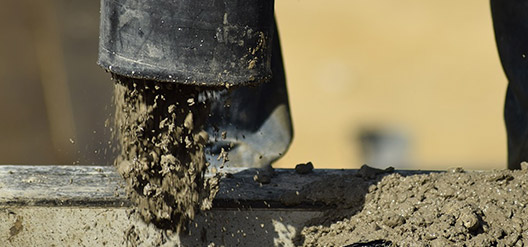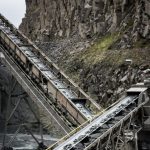Special demands
■Fenner dunlop BV GT
Fenner Dunlop BV GT is a unique and outstanding rubber compound specifically developed by Fenner Dunlop technicians to withstand multiple combinations of some of the toughest and most demanding operating conditions imaginable as well as providing unbeatable belt life expectancy. Fenner Dunlop BV GT is the ideal solution for a multitude of demands and environments including the transportation of hot asphalt, wood pellets, biomass and grain.
The many features of Fenner Dunlop BVGT include:
■ Heat resistant ISO 4195 CLASS T1 able to carry hot materials at continuous temperatures up to 150°C and peak temperatures of up to 170°C
■ Oil and chemical resistant ASTM ‘D’ 1460
■ Fire-resistant EN 12882 CLASS 2A AND 2B
■ Abrasion (wear) resistant DIN ‘X’ AND ISO ‘H’
■ Anti-static EN/ISO 20284 can, therefore, be used in ATEX classified areas
■ Ozone & UV resistant EN/ISO 1431
■ REACH compliant EC 1907/2006)
■Fenner dunlop BV VT
The BV VT belting range is a specially designed belt for the transport of sulphur. This quality is flame-retardant according to the ISO 340 and MSHA 2G18.
This flame-retardant quality has the following characteristics:
■ Flame retardancy according to ISO 340 and MSHA 2G18
■ Anti-static according to ISO284 / EN20284
■ High sulphur resistance including for wet sulphur
■ High acid resistance
■ Medium oil resistant
■ Heat resistant until 80°C material temperature
■ Abrasion (wear) resistant ISO 4649 / DIN 53516
■Fenner DUNLOP ROS COLDSTAR
Fenner Dunlop ROS Coldstar rubber compound is designed to resist the highly damaging effects of both mineral and vegetable oils (under ASTM ‘D’ test conditions) while still being able to remain fully functional in extremely cold conditions where temperatures can be as low as minus 40°C. In addition to these exceptional qualities, Fenner Dunlop Coldstar ROS also provides extended wear life because under EN/ISO 4649 / DIN 53516 test conditions it exceeds the abrasion requirements in DIN ‘X’ and ISO ‘H’ standards by more than 20%. As with all Fenner Dunlop cover grades, Fenner Dunlop ROS Coldstar is fully resistant to the effects of ground-level ozone and ultraviolet light (EN/ISO 1431).
The many positive advantages of Fenner Dunlop ROS Coldstar include:
■ Fenner Dunlop ROS Coldstar is highly resistant to both mineral and vegetable oils (ASTM ‘D’ 1460 testing)
■ Is able to remain fully functional in temperatures as low as minus 40°C
■ Abrasion (wear) resistant levels are more than 20% superior to DIN ‘X’ and ISO ‘H’ standard abrasion requirement
■ Anti-static (ISO284 / EN20284) and can therefore be used in ATEX classified areas
■ Ozone & UV resistant EN/ISO 1431
■ REACH compliant (EC 1907/2006)
■Fenner DUNLOP RAS & Fenner DUNLOP RAS COLDSTAR
Fenner Dunlop RAS rubber compounds were specifically developed by Fenner Dunlop technicians to provide unbeatable wear life. Fenner Dunlop RAS (and also RAS Coldstar) has an abrasion resistance under EN/ISO 4649 / DIN 53516 test conditions that is more than 50% superior to the highest abrasion tests standards set within DIN ‘W’ and ISO ‘D’. This means that Fenner Dunlop RAS and Fenner Dunlop Coldstar RAS is ideally suited to conveying even the most aggressively abrasive materials. Both Fenner Dunlop RAS (minus 40°C) and Fenner Dunlop Coldstar RAS (minus 60°C) also have outstanding resistance to extreme cold. They are therefore able to remain fully functional in some of the toughest and most inhospitable operating conditions in the world.
The many positive advantages of Fenner Dunlop RAS and Fenner Dunlop RAS Coldstar include:
■ Fenner Dunlop RAS is able to operate in temperatures as low as minus 40°C
■ Fenner Dunlop RAS Coldstar is able to remain fully functional in temperatures as low as minus 60°C
■ Abrasion (wear) resistant levels more than 50% superior to DIN ‘W’ and ISO ‘D’ standard abrasion requirement
■ Anti-static (ISO284 / EN20284) and can therefore be used in ATEX classified areas
■ Ozone & UV resistant EN/ISO 1431
■ REACH compliant (EC 1907/2006)
■Fenner DUNLOP RES
Fenner Dunlop RES rubber compound was specially developed by Fenner Dunlop technicians as a solution for applications that convey particularly aggressive materials such as heavy, sharp rocks including granite and dolerite. Fenner Dunlop RES has exceptional resistance to the impact, abrasion, cutting and gouging caused by heavy, sharp materials and high drop heights. It also possesses outstanding resistance against tear (rip) propagation. These exceptional physical properties, exceeding DIN ‘X’ and ISO ‘H’ requirements, combined with a resistance to abrasion under EN/ISO 4649 / DIN 53516 test conditions which even exceeds DIN ‘W’ and ISO ‘D’ standard requirement, means that Fenner Dunlop RES provides a truly unbeatable wear life. It is also able to operate in exceptionally cold operating conditions as low as minus 40°C.
The many positive advantages of Fenner Dunlop RES include:
■ Exceptional resistance to impact, abrasion, cutting and gouging, exceeds DIN ‘X’ and ISO ‘H’
■ Outstanding resistance against tear (rip) propagation
■ Abrasion (wear) resistant levels exceed DIN ‘W’ and ISO ‘D’ standard abrasion requirement
■ Fenner Dunlop RES is able to operate in temperatures as low as minus 40°C
■ Anti-static (ISO284 / EN20284) and can therefore be used in ATEX classified areas
■ Ozone & UV resistant EN/ISO 1431
■ REACH compliant (EC 1907/2006)
Download technical bulletin
In this brochure, you will find information about BVGT rubber compound


